Shows
 Science FridayHow Do Bacteria Talk To Each Other?Bacteria have been around for billions of years. Could they have come up with complex behaviors that we just don’t understand yet? Could they have their own language? Their own culture? Their own complex societies playing out right under, and in, our noses?
Microbiologist Bonnie Bassler has been studying these questions for more than 30 years. She talks with Host Flora Lichtman about the wild world of bacterial communication, and how understanding microbes could help us understand ourselves.
Guest: Dr. Bonnie Bassler, microbiologist at Princeton University
Transcript will be available after the show air...2025-05-0823 min
Science FridayHow Do Bacteria Talk To Each Other?Bacteria have been around for billions of years. Could they have come up with complex behaviors that we just don’t understand yet? Could they have their own language? Their own culture? Their own complex societies playing out right under, and in, our noses?
Microbiologist Bonnie Bassler has been studying these questions for more than 30 years. She talks with Host Flora Lichtman about the wild world of bacterial communication, and how understanding microbes could help us understand ourselves.
Guest: Dr. Bonnie Bassler, microbiologist at Princeton University
Transcript will be available after the show air...2025-05-0823 min Science FridayHow Do Bacteria Talk To Each Other?Bacteria have been around for billions of years. Could they have come up with complex behaviors that we just don’t understand yet? Could they have their own language? Their own culture? Their own complex societies playing out right under, and in, our noses? Microbiologist Bonnie Bassler has been studying these questions for more than 30 years. She talks with Host Flora Lichtman about the wild world of bacterial communication, and how understanding microbes could help us understand ourselves.Guest: Dr. Bonnie Bassler, microbiologist at Princeton UniversityTranscript will be available after the show air...2025-05-0823 min
Science FridayHow Do Bacteria Talk To Each Other?Bacteria have been around for billions of years. Could they have come up with complex behaviors that we just don’t understand yet? Could they have their own language? Their own culture? Their own complex societies playing out right under, and in, our noses? Microbiologist Bonnie Bassler has been studying these questions for more than 30 years. She talks with Host Flora Lichtman about the wild world of bacterial communication, and how understanding microbes could help us understand ourselves.Guest: Dr. Bonnie Bassler, microbiologist at Princeton UniversityTranscript will be available after the show air...2025-05-0823 min Grounded Wellness by Primally PureEp. 19: What the FDA Doesn't Want You to Know about Raw Milk + Pasteurization with Mark McAfeeIn this episode of Grounded Wellness, Bethany sat down with the founder of the world’s largest raw dairy, Raw Farm, to set the record straight. Mark McAfee is a premed-trained retired EMS Paramedic with decades of experience and science-backed knowledge on this highly controversial topic – including important missing context, marketing ploys, and overlooked data. From corrupt systems that isolate consumers and farmers to valid concerns with raw milk – this conversation will stretch the limits of what you thought possible with something as seemingly innocent as a glass of milk.Let’s dig in.Episode Resources:Mark McAfee:Raw Farm: ht...2025-01-291h 02
Grounded Wellness by Primally PureEp. 19: What the FDA Doesn't Want You to Know about Raw Milk + Pasteurization with Mark McAfeeIn this episode of Grounded Wellness, Bethany sat down with the founder of the world’s largest raw dairy, Raw Farm, to set the record straight. Mark McAfee is a premed-trained retired EMS Paramedic with decades of experience and science-backed knowledge on this highly controversial topic – including important missing context, marketing ploys, and overlooked data. From corrupt systems that isolate consumers and farmers to valid concerns with raw milk – this conversation will stretch the limits of what you thought possible with something as seemingly innocent as a glass of milk.Let’s dig in.Episode Resources:Mark McAfee:Raw Farm: ht...2025-01-291h 02 Grounded Wellness by Primally Pure#19: What the FDA Doesn't Want You to Know about Raw Milk + Pasteurization with Mark McAfeeIn this episode of Grounded Wellness, Bethany sat down with the founder of the world’s largest raw dairy, Raw Farm, to set the record straight. Mark McAfee is a premed-trained retired EMS Paramedic with decades of experience and science-backed knowledge on this highly controversial topic – including important missing context, marketing ploys, and overlooked data. From corrupt systems that isolate consumers and farmers to valid concerns with raw milk – this conversation will stretch the limits of what you thought possible with something as seemingly innocent as a glass of milk.Let’s dig in.Episode Resources:Mark McAfee:Raw Farm: ht...2025-01-291h 02
Grounded Wellness by Primally Pure#19: What the FDA Doesn't Want You to Know about Raw Milk + Pasteurization with Mark McAfeeIn this episode of Grounded Wellness, Bethany sat down with the founder of the world’s largest raw dairy, Raw Farm, to set the record straight. Mark McAfee is a premed-trained retired EMS Paramedic with decades of experience and science-backed knowledge on this highly controversial topic – including important missing context, marketing ploys, and overlooked data. From corrupt systems that isolate consumers and farmers to valid concerns with raw milk – this conversation will stretch the limits of what you thought possible with something as seemingly innocent as a glass of milk.Let’s dig in.Episode Resources:Mark McAfee:Raw Farm: ht...2025-01-291h 02 Matters MicrobialIt takes a quorum to cause diseaseToday, Associate Professor of Biology Dr. Julia van Kessel of Indiana University will chat with us about how groups of bacteria can sense one another and carry out behavior as a collective…including some kinds of disease! Host: Mark O. Martin Guest: Julia van Kessel Subscribe: Apple Podcasts, Spotify Become a patron of Matters Microbial! Links for this episode An introduction to the horrific disease leprosy, caused by the quite strange organism Mycobacterium leprae. An overview of the Hansen Institute in Ethiopia. A solid overview of quorum sensing. A very interes...2024-01-181h 00
Matters MicrobialIt takes a quorum to cause diseaseToday, Associate Professor of Biology Dr. Julia van Kessel of Indiana University will chat with us about how groups of bacteria can sense one another and carry out behavior as a collective…including some kinds of disease! Host: Mark O. Martin Guest: Julia van Kessel Subscribe: Apple Podcasts, Spotify Become a patron of Matters Microbial! Links for this episode An introduction to the horrific disease leprosy, caused by the quite strange organism Mycobacterium leprae. An overview of the Hansen Institute in Ethiopia. A solid overview of quorum sensing. A very interes...2024-01-181h 00 English Academic Vocabulary Booster4866. 200 Academic Words Reference from "Bonnie Bassler: How bacteria "talk" | TED Talk"This podcast is a commentary and does not contain any copyrighted material of the reference source.
We strongly recommend accessing/buying the reference source at the same time.
■Reference Source
https://www.ted.com/talks/bonnie_bassler_how_bacteria_talk
■Post on this topic (You can get FREE learning materials!)
https://englist.me/200-academic-words-reference-from-bonnie-bassler-how-bacteria-talk-ted-talk/
■Youtube Video
https://youtu.be/uLHv_fQJmcU (All Words)
https://youtu.be/TPvx-lAgfMU (Advanced Words)
https://youtu.be/hVTOWArxXV4 (Quick Look)
...2023-09-162h 59
English Academic Vocabulary Booster4866. 200 Academic Words Reference from "Bonnie Bassler: How bacteria "talk" | TED Talk"This podcast is a commentary and does not contain any copyrighted material of the reference source.
We strongly recommend accessing/buying the reference source at the same time.
■Reference Source
https://www.ted.com/talks/bonnie_bassler_how_bacteria_talk
■Post on this topic (You can get FREE learning materials!)
https://englist.me/200-academic-words-reference-from-bonnie-bassler-how-bacteria-talk-ted-talk/
■Youtube Video
https://youtu.be/uLHv_fQJmcU (All Words)
https://youtu.be/TPvx-lAgfMU (Advanced Words)
https://youtu.be/hVTOWArxXV4 (Quick Look)
...2023-09-162h 59 Night Science39 | Bonnie Bassler and living on the edge in a nerdy kind of wayBonnie Bassler is the Chair of the Molecular Biology Department at Princeton. In this episode, Bonnie talks about her passion for scientific inquiry, creativity, mentorship, and how the journey of discovery is about asking the right questions, distinguishing between what you can do and what you should do, and about embracing the unexpected. In our very lively and fun discussion, we explore the significance of asking "why" questions to fuel passion and curiosity – even if only the if/what/when/how questions lead to clear answers – and we expl...2023-08-1438 min
Night Science39 | Bonnie Bassler and living on the edge in a nerdy kind of wayBonnie Bassler is the Chair of the Molecular Biology Department at Princeton. In this episode, Bonnie talks about her passion for scientific inquiry, creativity, mentorship, and how the journey of discovery is about asking the right questions, distinguishing between what you can do and what you should do, and about embracing the unexpected. In our very lively and fun discussion, we explore the significance of asking "why" questions to fuel passion and curiosity – even if only the if/what/when/how questions lead to clear answers – and we expl...2023-08-1438 min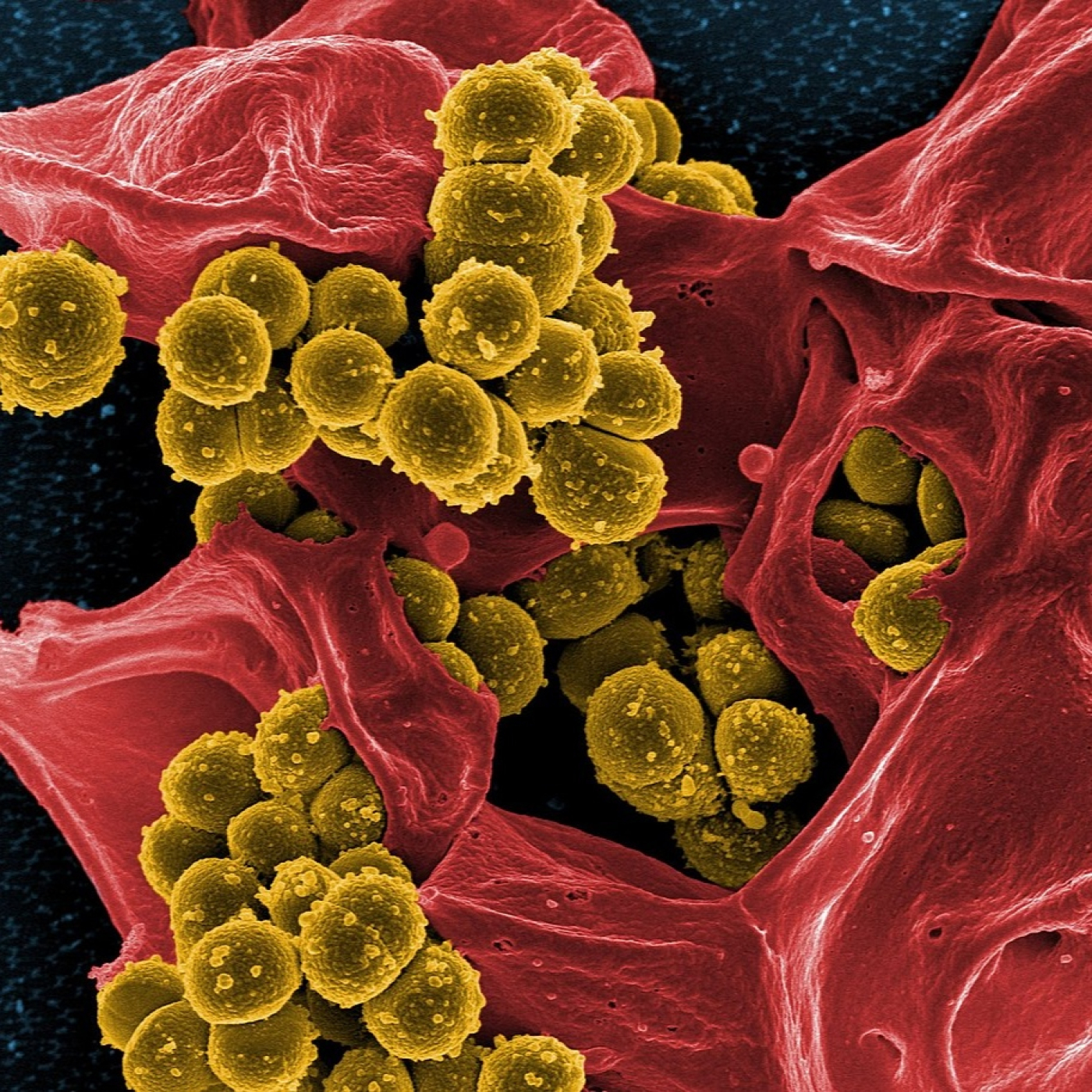 Aparici en ÓrbitaAparici en Órbita s05e19: Microbiota y comunicación entre bacterias, con Ginés MorataEsta semana se ha hecho público el Premio Princesa de Asturias de Ciencia y Tecnología, y este humilde servidor vuestro ha estado entre el jurado :) El premio ha reconocido los trabajos de Jeffrey Gordon, Peter Greenberg y Bonnie Bassler que han contribuido a entender el papel de las comunidades de microorganismos en nuestro planeta, y en particular las comunidades que habitan a los seres humanos: nuestra microbiota. Antes de estos trabajos se tendía a pensar en los microorganismos como seres esencialmente solitarios, o sin las herramientas necesarias para relacionarse entre ellos y con ningún otro ser vivo...2023-06-1033 min
Aparici en ÓrbitaAparici en Órbita s05e19: Microbiota y comunicación entre bacterias, con Ginés MorataEsta semana se ha hecho público el Premio Princesa de Asturias de Ciencia y Tecnología, y este humilde servidor vuestro ha estado entre el jurado :) El premio ha reconocido los trabajos de Jeffrey Gordon, Peter Greenberg y Bonnie Bassler que han contribuido a entender el papel de las comunidades de microorganismos en nuestro planeta, y en particular las comunidades que habitan a los seres humanos: nuestra microbiota. Antes de estos trabajos se tendía a pensar en los microorganismos como seres esencialmente solitarios, o sin las herramientas necesarias para relacionarse entre ellos y con ningún otro ser vivo...2023-06-1033 min Morgellons DiscussionIntroduction To Morgellons Free Online CourseHomepage | The New Morgellons Movement (teachable.com)
This online course presents the facts about Morgellons in a way that can be easily retained. In fact, many people who experience this course will be surprised that their ideas about what Morgellons is can be so readily challenged with scientific information.
More Morgellons • A podcast on Anchor
A course in Morgellons of course by More Morgellons (anchor.fm)
Lyme lawsuit dropped against IDSA panelists, remains against organization (lymedisease.org)
Bonnie Bassler: How bacteria "talk" | TED Talk
Dr. Eva Sapi...2021-10-2312 min
Morgellons DiscussionIntroduction To Morgellons Free Online CourseHomepage | The New Morgellons Movement (teachable.com)
This online course presents the facts about Morgellons in a way that can be easily retained. In fact, many people who experience this course will be surprised that their ideas about what Morgellons is can be so readily challenged with scientific information.
More Morgellons • A podcast on Anchor
A course in Morgellons of course by More Morgellons (anchor.fm)
Lyme lawsuit dropped against IDSA panelists, remains against organization (lymedisease.org)
Bonnie Bassler: How bacteria "talk" | TED Talk
Dr. Eva Sapi...2021-10-2312 min Planet B612Reproductive Immunology with Dr. Melanie ConradWhat role might the environment play on autoimmune diseases, like asthma? What could we learn about antibiotic use in pregnant women? Reproductive immunologist, and researcher, Dr. Melanie Conrad joins me to talk about these topics, and about the work she, and her team, are doing to uncover new information about how the immune system works!(0:00:45) Moving to Germany and accents.(0:02:42) Research and the study of asthma.(0:04:07) The journey to studying asthma.(0:06:22) Environmental causes of asthma and the role of traditional farms.(0:08:00) Generational studies and the Dutch Hunger Winter.(0:09:35) Why growing up on a farm can help your respiratory...2021-09-2352 min
Planet B612Reproductive Immunology with Dr. Melanie ConradWhat role might the environment play on autoimmune diseases, like asthma? What could we learn about antibiotic use in pregnant women? Reproductive immunologist, and researcher, Dr. Melanie Conrad joins me to talk about these topics, and about the work she, and her team, are doing to uncover new information about how the immune system works!(0:00:45) Moving to Germany and accents.(0:02:42) Research and the study of asthma.(0:04:07) The journey to studying asthma.(0:06:22) Environmental causes of asthma and the role of traditional farms.(0:08:00) Generational studies and the Dutch Hunger Winter.(0:09:35) Why growing up on a farm can help your respiratory...2021-09-2352 min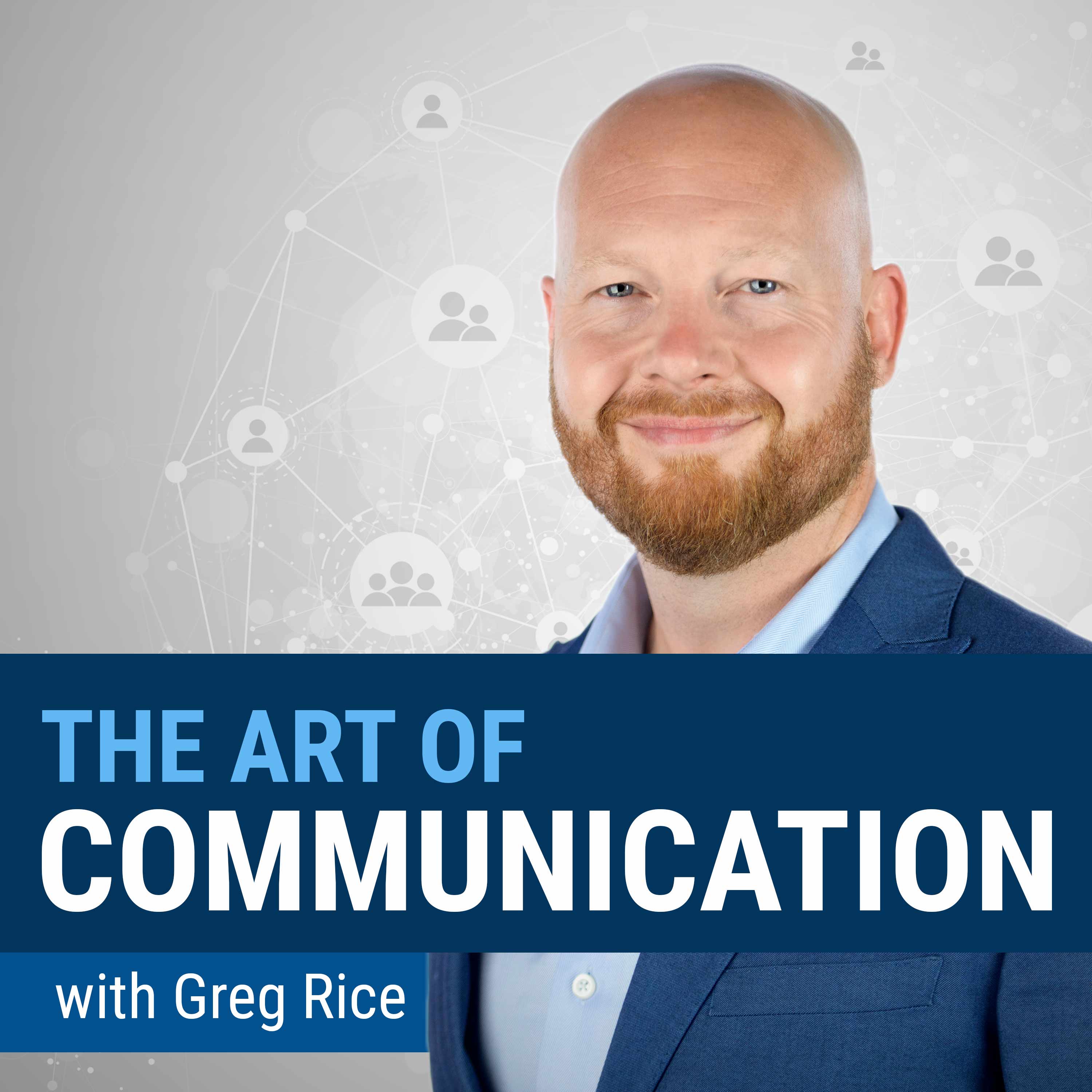 The Art of Communication097: Scott Smith | A Blue Print For Easily Making Connections With New PeopleNetworking should be purposeful. Otherwise, you’re doing it wrong. This common networking mistake that people make is discussed by Scott Smith, a self-professed motivational speaker, and networking expert. Scott helps his clients get the most out of their networks through his 6-step science-based approach that relies on motivational listening and a part of the brain called the orbital cortex. You would not want to miss this episode because these are all important lessons that you can apply in the next networking event you’re going to attend.Let’s listen to Scott a...2021-03-2249 min
The Art of Communication097: Scott Smith | A Blue Print For Easily Making Connections With New PeopleNetworking should be purposeful. Otherwise, you’re doing it wrong. This common networking mistake that people make is discussed by Scott Smith, a self-professed motivational speaker, and networking expert. Scott helps his clients get the most out of their networks through his 6-step science-based approach that relies on motivational listening and a part of the brain called the orbital cortex. You would not want to miss this episode because these are all important lessons that you can apply in the next networking event you’re going to attend.Let’s listen to Scott a...2021-03-2249 min The Joy of xBonnie Bassler on Talkative Bacteria and Eavesdropping VirusesThe molecular biologist Bonnie Bassler is deciphering the chemical languages that bacteria use to coordinate their assaults on a host. The post Bonnie Bassler on Talkative Bacteria and Eavesdropping Viruses first appeared on Quanta Magazine2021-03-0839 min
The Joy of xBonnie Bassler on Talkative Bacteria and Eavesdropping VirusesThe molecular biologist Bonnie Bassler is deciphering the chemical languages that bacteria use to coordinate their assaults on a host. The post Bonnie Bassler on Talkative Bacteria and Eavesdropping Viruses first appeared on Quanta Magazine2021-03-0839 min The Joy of xPodcast Preview: The Joy of x, Season TwoHosted by Steven Strogatz, The Joy of x podcast is back with new episodes that explore the inner worlds of top-tier scientists and mathematicians like Frank Wilczek, Bonnie Bassler and Amie Wilkinson. The post Podcast Preview: The Joy of x, Season Two first appeared on Quanta Magazine2021-02-2302 min
The Joy of xPodcast Preview: The Joy of x, Season TwoHosted by Steven Strogatz, The Joy of x podcast is back with new episodes that explore the inner worlds of top-tier scientists and mathematicians like Frank Wilczek, Bonnie Bassler and Amie Wilkinson. The post Podcast Preview: The Joy of x, Season Two first appeared on Quanta Magazine2021-02-2302 min Der coliquio Podcast. Wissenschaft kompakt.Alkohol steigert das Risiko von Vorhofflimmern | Einsamkeit kostet HirnsubstanzDer coliquio-Podcast - Wissenschaft kompakt
Absprachen unter Bakterien – Relevanz für die Medizin
Beitrag auf coliquio: Bakterien belauscht: Neue Ansätze in der Antibiotika-Forschung?
dpa; 27.01.2021.
Goethe Universität Frankfurt am Main, 27.01.2021: Michael R. Silverman und Bonnie L. Bassler erhalten den Paul Ehrlich- und Ludwig Darmstaedter-Preis 2021
Alkohol & Vorhofflimmern: Bereits ein Glas pro Tag gefährlich?
European Society of Cardiology, 17.01.2021: One small alcoholic drink a day is linked to an increased risk of atrial fibrillation
Kardiologie.org, 13.01.2021: Alkohol & Vorhofflimmern – ist ein Drink am Tag schon zu viel?
Soziale Faktoren beeinflussen Gehirnstruktur
Van der Velpen et al.: „Social hea...2021-02-1709 min
Der coliquio Podcast. Wissenschaft kompakt.Alkohol steigert das Risiko von Vorhofflimmern | Einsamkeit kostet HirnsubstanzDer coliquio-Podcast - Wissenschaft kompakt
Absprachen unter Bakterien – Relevanz für die Medizin
Beitrag auf coliquio: Bakterien belauscht: Neue Ansätze in der Antibiotika-Forschung?
dpa; 27.01.2021.
Goethe Universität Frankfurt am Main, 27.01.2021: Michael R. Silverman und Bonnie L. Bassler erhalten den Paul Ehrlich- und Ludwig Darmstaedter-Preis 2021
Alkohol & Vorhofflimmern: Bereits ein Glas pro Tag gefährlich?
European Society of Cardiology, 17.01.2021: One small alcoholic drink a day is linked to an increased risk of atrial fibrillation
Kardiologie.org, 13.01.2021: Alkohol & Vorhofflimmern – ist ein Drink am Tag schon zu viel?
Soziale Faktoren beeinflussen Gehirnstruktur
Van der Velpen et al.: „Social hea...2021-02-1709 min Meet the MicrobiologistIt’s our 100th Episode! A retrospective into Meet the Microbiologist with Merry Buckley and Carl ZimmerWe pull back the curtain as former show hosts Merry Buckley and Carl Zimmer talk Meet the Scientist origins, favorite interviews and microbial topics. Julie’s Biggest Takeaways: Though the show started before podcasts were as popular as they are now, this didn’t pose a problem for Merry or Carl when soliciting guests - scientists were happy to have their work featured and to discuss their research. Inviting guests may involve bringing in a mix of experienced and early-career researchers, but both Merry and Carl agreed that the science is the major deci...2019-01-2531 min
Meet the MicrobiologistIt’s our 100th Episode! A retrospective into Meet the Microbiologist with Merry Buckley and Carl ZimmerWe pull back the curtain as former show hosts Merry Buckley and Carl Zimmer talk Meet the Scientist origins, favorite interviews and microbial topics. Julie’s Biggest Takeaways: Though the show started before podcasts were as popular as they are now, this didn’t pose a problem for Merry or Carl when soliciting guests - scientists were happy to have their work featured and to discuss their research. Inviting guests may involve bringing in a mix of experienced and early-career researchers, but both Merry and Carl agreed that the science is the major deci...2019-01-2531 min RadioScience#42 Chit-chatting with bacteriaDrugs that stop bacteria from talking might be new, powerful antibiotics – a much needed weapon in our never-ending struggle against bacterial infections. On the other hand, drugs that make bacteria chat more could boost the production of biofuels and other industrial goods that bacteria make for us. In 1990 a young Bonnie Bassler, mesmerized by glow-in-the-dark bacteria that could talk to their peers to coordinate light production, wondered whether other bacteria could talk too. The answer, she soon found out, was yes – including all the nasty bacteria that cause disease. Today, Bonnie Bassler is a professor in molecular biolog...2016-10-0733 min
RadioScience#42 Chit-chatting with bacteriaDrugs that stop bacteria from talking might be new, powerful antibiotics – a much needed weapon in our never-ending struggle against bacterial infections. On the other hand, drugs that make bacteria chat more could boost the production of biofuels and other industrial goods that bacteria make for us. In 1990 a young Bonnie Bassler, mesmerized by glow-in-the-dark bacteria that could talk to their peers to coordinate light production, wondered whether other bacteria could talk too. The answer, she soon found out, was yes – including all the nasty bacteria that cause disease. Today, Bonnie Bassler is a professor in molecular biolog...2016-10-0733 min RadioScience#41 BakteriesnackLäkemedel som hindrar bakterierna från att prata med varandra kan bli en ny sorts kraftfull antibiotika - ett vapen som vi verkligen skulle behöva i vår eviga kamp mot bakterieinfektioner. Å andra sidan skulle vi också ha nytta av att kunna få bakterier att prata mer med varandra. Till exempel för att boosta produktionen av biobränslen och annat som bakterier kan tillverka åt oss. 1990 började en ung Bonnie Bassler, som var helt uppslukad av att självlysande bakterier kunde prata med sina kompisar, och koordinera sitt lysande, undra om andra bakterier också kunde snack...2016-10-0734 min
RadioScience#41 BakteriesnackLäkemedel som hindrar bakterierna från att prata med varandra kan bli en ny sorts kraftfull antibiotika - ett vapen som vi verkligen skulle behöva i vår eviga kamp mot bakterieinfektioner. Å andra sidan skulle vi också ha nytta av att kunna få bakterier att prata mer med varandra. Till exempel för att boosta produktionen av biobränslen och annat som bakterier kan tillverka åt oss. 1990 började en ung Bonnie Bassler, som var helt uppslukad av att självlysande bakterier kunde prata med sina kompisar, och koordinera sitt lysande, undra om andra bakterier också kunde snack...2016-10-0734 min Annual Reviews ConversationsA Conversation with Eric F. WieschausEric Wieschaus, Squibb Professor in Molecular Biology at Princeton University, talks with Bonnie Bassler, his colleague at Princeton and the Editor of the Annual Review of Genetics, about his life and career. Dr. Wieschaus describes his beginnings as a young boy in Alabama, and recounts how his interest in science was sparked by a science camp in Kansas funded by the National Science Foundation when he was a teenager. After a bachelor's degree at Notre Dame, Dr. Wieschaus was admitted to graduate school at Yale University, where he studied under the direction of Swiss Developmental Biologist Walter Gehring. Dr. G...2014-02-261h 04
Annual Reviews ConversationsA Conversation with Eric F. WieschausEric Wieschaus, Squibb Professor in Molecular Biology at Princeton University, talks with Bonnie Bassler, his colleague at Princeton and the Editor of the Annual Review of Genetics, about his life and career. Dr. Wieschaus describes his beginnings as a young boy in Alabama, and recounts how his interest in science was sparked by a science camp in Kansas funded by the National Science Foundation when he was a teenager. After a bachelor's degree at Notre Dame, Dr. Wieschaus was admitted to graduate school at Yale University, where he studied under the direction of Swiss Developmental Biologist Walter Gehring. Dr. G...2014-02-261h 04 World QuestionsExchanges at the Frontier: 08Feb14 - Bonnie BasslerBonnie Bassler is the world specialist in how bacteria communicate within the human body. She explains to A.C.Grayling and pupils at Haverstock School, that this process holds the key to solving the problem of failing antibiotics.2014-02-0749 min
World QuestionsExchanges at the Frontier: 08Feb14 - Bonnie BasslerBonnie Bassler is the world specialist in how bacteria communicate within the human body. She explains to A.C.Grayling and pupils at Haverstock School, that this process holds the key to solving the problem of failing antibiotics.2014-02-0749 min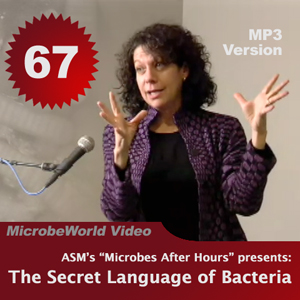 MicrobeWorld Video (audio only)MWV 67 - The Secret Language of Bacteria (Audio Only)No bacterium lives alone – it is constantly encountering members of its own species as well as other kinds of bacteria and diverse organisms like viruses, fungi, plants and animals. To navigate a complex world, microbes use chemical signals to sense and communicate with one another.
Recorded live on January 28th, 2013, at ASM's headquarters, catch a glimpse into the fascinating language of bacteria with discussions by Bonnie Bassler, Princeton University, and Steven Lindow, University of California, Berkley.
2013-02-0455 min
MicrobeWorld Video (audio only)MWV 67 - The Secret Language of Bacteria (Audio Only)No bacterium lives alone – it is constantly encountering members of its own species as well as other kinds of bacteria and diverse organisms like viruses, fungi, plants and animals. To navigate a complex world, microbes use chemical signals to sense and communicate with one another.
Recorded live on January 28th, 2013, at ASM's headquarters, catch a glimpse into the fascinating language of bacteria with discussions by Bonnie Bassler, Princeton University, and Steven Lindow, University of California, Berkley.
2013-02-0455 min MicrobeWorld Video HDMWV Episode 67 - The Secret Language of BacteriaNo bacterium lives alone – it is constantly encountering members of its own species as well as other kinds of bacteria and diverse organisms like viruses, fungi, plants and animals. To navigate a complex world, microbes use chemical signals to sense and communicate with one another.
Filmed live on January 28th, 2013, at ASM's headquarters, catch a glimpse into the fascinating language of bacteria with discussions by Bonnie Bassler, Princeton University, and Steven Lindow, University of California, Berkley.
Dr. Bonnie Bassler, Princeton University
Bonnie Bassler Ph.D. is a Howard Hughes Medical Institute Investigator and th...2013-02-0455 min
MicrobeWorld Video HDMWV Episode 67 - The Secret Language of BacteriaNo bacterium lives alone – it is constantly encountering members of its own species as well as other kinds of bacteria and diverse organisms like viruses, fungi, plants and animals. To navigate a complex world, microbes use chemical signals to sense and communicate with one another.
Filmed live on January 28th, 2013, at ASM's headquarters, catch a glimpse into the fascinating language of bacteria with discussions by Bonnie Bassler, Princeton University, and Steven Lindow, University of California, Berkley.
Dr. Bonnie Bassler, Princeton University
Bonnie Bassler Ph.D. is a Howard Hughes Medical Institute Investigator and th...2013-02-0455 min MicrobeWorld VideoMWV Episode 67 - The Secret Language of BacteriaNo bacterium lives alone – it is constantly encountering members of its own species as well as other kinds of bacteria and diverse organisms like viruses, fungi, plants and animals. To navigate a complex world, microbes use chemical signals to sense and communicate with one another.
Filmed live on January 28th, 2013, at ASM's headquarters, catch a glimpse into the fascinating language of bacteria with discussions by Bonnie Bassler, Princeton University, and Steven Lindow, University of California, Berkley.
Dr. Bonnie Bassler, Princeton University
Bonnie Bassler Ph.D. is a Howard Hughes Medical Institute Investigator and th...2013-02-0455 min
MicrobeWorld VideoMWV Episode 67 - The Secret Language of BacteriaNo bacterium lives alone – it is constantly encountering members of its own species as well as other kinds of bacteria and diverse organisms like viruses, fungi, plants and animals. To navigate a complex world, microbes use chemical signals to sense and communicate with one another.
Filmed live on January 28th, 2013, at ASM's headquarters, catch a glimpse into the fascinating language of bacteria with discussions by Bonnie Bassler, Princeton University, and Steven Lindow, University of California, Berkley.
Dr. Bonnie Bassler, Princeton University
Bonnie Bassler Ph.D. is a Howard Hughes Medical Institute Investigator and th...2013-02-0455 min NOVA Vodcast | PBSNSN | Profile: Bonnie BasslerHer insight into how bacteria "talk" has launched a revolution in biological and medical research.
Watch NOVA every Wednesday night on PBS. Or join us online at pbs.org/nova.
NOVA is produced by WGBH in Boston. Funding for NOVA scienceNOW is provided by the National Science Foundation, the Howard Hughes Medical Institute, the Alfred P. Sloan Foundation, the Corporation for Public Broadcasting, and PBS viewers.
Funding for NOVA is provided by David H. Koch, the Howard Hughes Medical Institute, the Corporation for Public Broadcasting, and PBS viewers.2011-12-2009 min
NOVA Vodcast | PBSNSN | Profile: Bonnie BasslerHer insight into how bacteria "talk" has launched a revolution in biological and medical research.
Watch NOVA every Wednesday night on PBS. Or join us online at pbs.org/nova.
NOVA is produced by WGBH in Boston. Funding for NOVA scienceNOW is provided by the National Science Foundation, the Howard Hughes Medical Institute, the Alfred P. Sloan Foundation, the Corporation for Public Broadcasting, and PBS viewers.
Funding for NOVA is provided by David H. Koch, the Howard Hughes Medical Institute, the Corporation for Public Broadcasting, and PBS viewers.2011-12-2009 min NOVA Vodcast | PBSNSN | Profile: Bonnie BasslerHer insight into how bacteria "talk" has launched a revolution in biological and medical research.
Watch NOVA every Wednesday night on PBS. Or join us online at pbs.org/nova.
NOVA is produced by WGBH in Boston. Funding for NOVA scienceNOW is provided by the National Science Foundation, the Howard Hughes Medical Institute, the Alfred P. Sloan Foundation, the Corporation for Public Broadcasting, and PBS viewers.
Funding for NOVA is provided by David H. Koch, the Howard Hughes Medical Institute, the Corporation for Public Broadcasting, and PBS viewers.2011-12-2009 min
NOVA Vodcast | PBSNSN | Profile: Bonnie BasslerHer insight into how bacteria "talk" has launched a revolution in biological and medical research.
Watch NOVA every Wednesday night on PBS. Or join us online at pbs.org/nova.
NOVA is produced by WGBH in Boston. Funding for NOVA scienceNOW is provided by the National Science Foundation, the Howard Hughes Medical Institute, the Alfred P. Sloan Foundation, the Corporation for Public Broadcasting, and PBS viewers.
Funding for NOVA is provided by David H. Koch, the Howard Hughes Medical Institute, the Corporation for Public Broadcasting, and PBS viewers.2011-12-2009 min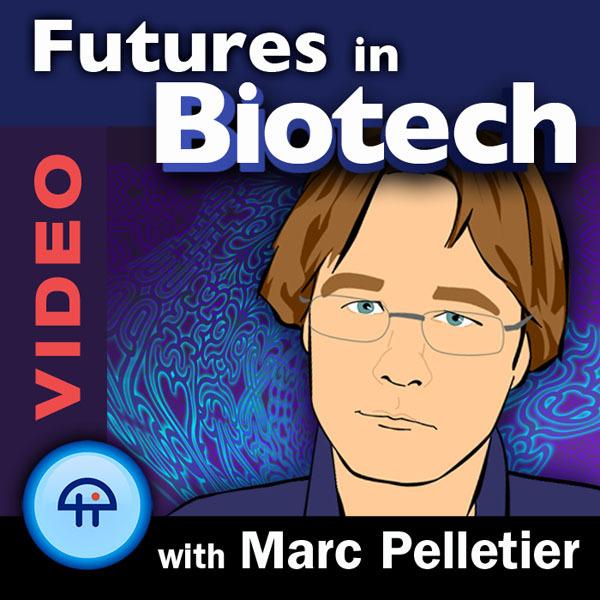 Futures in Biotech (Video)A Four Billion Year Old Social Network - How controlling bacterial behavior may lead to a new class of urgently needed antibiotics.
How controlling bacterial behavior may lead to a new class of urgently needed antibiotics.
Host: Marc Pelletier
Guest: Dr. Bonnie Bassler
We invite you to read, add to, and amend our show notes.
Comments and suggestions on Futures in Biotech.
Sponsored by: Synergy 1.
Also thanks to Phil Pelletier and Will Hall for the great themes.
Thanks to CacheFly for providing the bandwidth for this netcast.
2010-12-1147 min
Futures in Biotech (Video)A Four Billion Year Old Social Network - How controlling bacterial behavior may lead to a new class of urgently needed antibiotics.
How controlling bacterial behavior may lead to a new class of urgently needed antibiotics.
Host: Marc Pelletier
Guest: Dr. Bonnie Bassler
We invite you to read, add to, and amend our show notes.
Comments and suggestions on Futures in Biotech.
Sponsored by: Synergy 1.
Also thanks to Phil Pelletier and Will Hall for the great themes.
Thanks to CacheFly for providing the bandwidth for this netcast.
2010-12-1147 min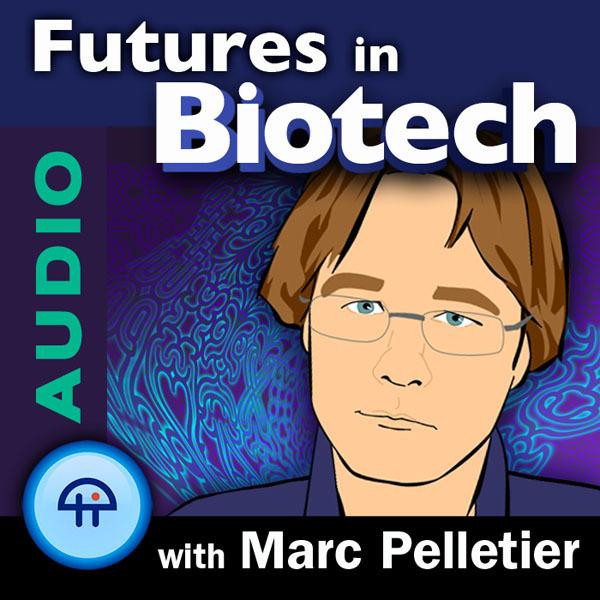 Futures in Biotech (Audio)A Four Billion Year Old Social Network - How controlling bacterial behavior may lead to a new class of urgently needed antibiotics.
How controlling bacterial behavior may lead to a new class of urgently needed antibiotics.
Host: Marc Pelletier
Guest: Dr. Bonnie Bassler
Sponsored by: Synergy 1.
Thanks to Phil Pelletier and Will Hall for the great themes.
Thanks to CacheFly for providing the bandwidth for this netcast.
2010-12-1147 min
Futures in Biotech (Audio)A Four Billion Year Old Social Network - How controlling bacterial behavior may lead to a new class of urgently needed antibiotics.
How controlling bacterial behavior may lead to a new class of urgently needed antibiotics.
Host: Marc Pelletier
Guest: Dr. Bonnie Bassler
Sponsored by: Synergy 1.
Thanks to Phil Pelletier and Will Hall for the great themes.
Thanks to CacheFly for providing the bandwidth for this netcast.
2010-12-1147 min NOVA scienceNOWNOVA Minute: Bonnie BasslerIn this NOVA Minute, biologist Bonnie Bassler explains how bacteria "talk" to one another.
Produced by David Levin. NOVA is produced by WGBH in Boston. Funding for NOVA is provided by ExxonMobil, David H. Koch, the Howard Hughes Medical Institute, the Corporation for Public Broadcasting, and public television viewers.
Learn more at pbs.org/nova/sciencenow2010-08-0201 min
NOVA scienceNOWNOVA Minute: Bonnie BasslerIn this NOVA Minute, biologist Bonnie Bassler explains how bacteria "talk" to one another.
Produced by David Levin. NOVA is produced by WGBH in Boston. Funding for NOVA is provided by ExxonMobil, David H. Koch, the Howard Hughes Medical Institute, the Corporation for Public Broadcasting, and public television viewers.
Learn more at pbs.org/nova/sciencenow2010-08-0201 min NOVA | PBSNOVA Minute: Bonnie BasslerIn this NOVA Minute, biologist Bonnie Bassler explains how bacteria "talk" to one another.
Produced by David Levin. NOVA is produced by WGBH in Boston. Funding for NOVA is provided by ExxonMobil, David H. Koch, the Howard Hughes Medical Institute, the Corporation for Public Broadcasting, and public television viewers.
Learn more at pbs.org/nova/sciencenow2010-08-0201 min
NOVA | PBSNOVA Minute: Bonnie BasslerIn this NOVA Minute, biologist Bonnie Bassler explains how bacteria "talk" to one another.
Produced by David Levin. NOVA is produced by WGBH in Boston. Funding for NOVA is provided by ExxonMobil, David H. Koch, the Howard Hughes Medical Institute, the Corporation for Public Broadcasting, and public television viewers.
Learn more at pbs.org/nova/sciencenow2010-08-0201 min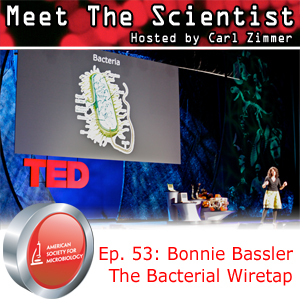 Meet the MicrobiologistMTS53 - Bonnie Bassler - The Bacterial WiretapIn this podcast I talk to Bonnie Bassler, a professor at Princeton and the president-elect of the American Society for Microbiology.
Bassler studies the conversations that bacteria have, using chemicals instead of words, Her research is not only helping to reveal how bacteria work together to make us sick, but also how we might interrupt their dialogue in order to cure infections.
Related Projects:
Measurement of the copy number of the master quorum-sensing regulator of a bacterial cell.
Information processing and signal integration in bacterial quorum sensing.
2010-07-0137 min
Meet the MicrobiologistMTS53 - Bonnie Bassler - The Bacterial WiretapIn this podcast I talk to Bonnie Bassler, a professor at Princeton and the president-elect of the American Society for Microbiology.
Bassler studies the conversations that bacteria have, using chemicals instead of words, Her research is not only helping to reveal how bacteria work together to make us sick, but also how we might interrupt their dialogue in order to cure infections.
Related Projects:
Measurement of the copy number of the master quorum-sensing regulator of a bacterial cell.
Information processing and signal integration in bacterial quorum sensing.
2010-07-0137 min MicrobeWorld Video HDMWV Episode 31 - Tiny ConspiraciesBacteria communicate with chemical languages that allow them to synchronize their behavior and thereby act as multi-cellular organisms. This process, called quorum sensing, enables bacteria to do things they canât do as a single cell, like successfully infect and cause disease in humans. Bonnie Bassler, Ph.D., the Squibb Professor of Molecular Biology at Princeton University and President-elect for the American Society for Microbiology, has been researching strategies that can interfere with quorum sensing and will hopefully yield novel antibiotics to prevent disease. In this episode of MicrobeWorld Video we present the full presentation D...2009-08-181h 14
MicrobeWorld Video HDMWV Episode 31 - Tiny ConspiraciesBacteria communicate with chemical languages that allow them to synchronize their behavior and thereby act as multi-cellular organisms. This process, called quorum sensing, enables bacteria to do things they canât do as a single cell, like successfully infect and cause disease in humans. Bonnie Bassler, Ph.D., the Squibb Professor of Molecular Biology at Princeton University and President-elect for the American Society for Microbiology, has been researching strategies that can interfere with quorum sensing and will hopefully yield novel antibiotics to prevent disease. In this episode of MicrobeWorld Video we present the full presentation D...2009-08-181h 14 MicrobeWorld VideoMWV Episode 31 - Tiny ConspiraciesBacteria communicate with chemical languages that allow them to synchronize their behavior and thereby act as multi-cellular organisms. This process, called quorum sensing, enables bacteria to do things they canât do as a single cell, like successfully infect and cause disease in humans. Bonnie Bassler, Ph.D., the Squibb Professor of Molecular Biology at Princeton University and President-elect for the American Society for Microbiology, has been researching strategies that can interfere with quorum sensing and will hopefully yield novel antibiotics to prevent disease. In this episode of MicrobeWorld Video we present the full presentation D...2009-08-181h 14
MicrobeWorld VideoMWV Episode 31 - Tiny ConspiraciesBacteria communicate with chemical languages that allow them to synchronize their behavior and thereby act as multi-cellular organisms. This process, called quorum sensing, enables bacteria to do things they canât do as a single cell, like successfully infect and cause disease in humans. Bonnie Bassler, Ph.D., the Squibb Professor of Molecular Biology at Princeton University and President-elect for the American Society for Microbiology, has been researching strategies that can interfere with quorum sensing and will hopefully yield novel antibiotics to prevent disease. In this episode of MicrobeWorld Video we present the full presentation D...2009-08-181h 14 MicrobeWorld Video (audio only)MWV Episode 31 - Tiny ConspiraciesBacteria communicate with chemical languages that allow them to synchronize their behavior and thereby act as multi-cellular organisms. This process, called quorum sensing, enables bacteria to do things they canât do as a single cell, like successfully infect and cause disease in humans. Bonnie Bassler, Ph.D., the Squibb Professor of Molecular Biology at Princeton University and President-elect for the American Society for Microbiology, has been researching strategies that can interfere with quorum sensing and will hopefully yield novel antibiotics to prevent disease. In this episode of MicrobeWorld Video we present the full presentation D...2009-08-181h 14
MicrobeWorld Video (audio only)MWV Episode 31 - Tiny ConspiraciesBacteria communicate with chemical languages that allow them to synchronize their behavior and thereby act as multi-cellular organisms. This process, called quorum sensing, enables bacteria to do things they canât do as a single cell, like successfully infect and cause disease in humans. Bonnie Bassler, Ph.D., the Squibb Professor of Molecular Biology at Princeton University and President-elect for the American Society for Microbiology, has been researching strategies that can interfere with quorum sensing and will hopefully yield novel antibiotics to prevent disease. In this episode of MicrobeWorld Video we present the full presentation D...2009-08-181h 14 NOVA Vodcast | PBSNSN | Profile: Bonnie BasslerHer insight into how bacteria "talk" has launched a revolution in biological and medical research.
NOVA is produced by WGBH in Boston. Funding for NOVA scienceNOW is provided the National Science Foundation, the Howard Hughes Medical Institute, the Alfred P. Sloan Foundation, the Corporation for Public Broadcasting, and public television viewers.
This material is based upon work supported by the National Science Foundation under Grant No. 0407101. Any opinions, findings, and conclusions or recommendations expressed in this material are those of the author(s) and do not necessarily reflect the views of the National Science Foundation.2009-05-0809 min
NOVA Vodcast | PBSNSN | Profile: Bonnie BasslerHer insight into how bacteria "talk" has launched a revolution in biological and medical research.
NOVA is produced by WGBH in Boston. Funding for NOVA scienceNOW is provided the National Science Foundation, the Howard Hughes Medical Institute, the Alfred P. Sloan Foundation, the Corporation for Public Broadcasting, and public television viewers.
This material is based upon work supported by the National Science Foundation under Grant No. 0407101. Any opinions, findings, and conclusions or recommendations expressed in this material are those of the author(s) and do not necessarily reflect the views of the National Science Foundation.2009-05-0809 min NOVA Vodcast | PBSNSN | Profile: Bonnie BasslerHer insight into how bacteria "talk" has launched a revolution in biological and medical research.
NOVA is produced by WGBH in Boston. Funding for NOVA scienceNOW is provided the National Science Foundation, the Howard Hughes Medical Institute, the Alfred P. Sloan Foundation, the Corporation for Public Broadcasting, and public television viewers.
This material is based upon work supported by the National Science Foundation under Grant No. 0407101. Any opinions, findings, and conclusions or recommendations expressed in this material are those of the author(s) and do not necessarily reflect the views of the National Science Foundation.2009-05-0809 min
NOVA Vodcast | PBSNSN | Profile: Bonnie BasslerHer insight into how bacteria "talk" has launched a revolution in biological and medical research.
NOVA is produced by WGBH in Boston. Funding for NOVA scienceNOW is provided the National Science Foundation, the Howard Hughes Medical Institute, the Alfred P. Sloan Foundation, the Corporation for Public Broadcasting, and public television viewers.
This material is based upon work supported by the National Science Foundation under Grant No. 0407101. Any opinions, findings, and conclusions or recommendations expressed in this material are those of the author(s) and do not necessarily reflect the views of the National Science Foundation.2009-05-0809 min The Official TED Talk GuideHow bacteria "talk" | Bonnie BasslerBonnie Bassler discovered that bacteria "talk" to each other, using a chemical language that lets them coordinate defense and mount attacks. The find has stunning implications for medicine, industry -- and our understanding of ourselves.2009-04-0818 min
The Official TED Talk GuideHow bacteria "talk" | Bonnie BasslerBonnie Bassler discovered that bacteria "talk" to each other, using a chemical language that lets them coordinate defense and mount attacks. The find has stunning implications for medicine, industry -- and our understanding of ourselves.2009-04-0818 min NOVA scienceNOWBacteria Unite!Bonnie Bassler of Princeton University explains how bacteria can "talk" with one another, and even join together in coordinated efforts. Scientists are beginning to see these microscopic creatures-once thought completely asocial-in a whole new way.
Podcast produced by Susan K. Lewis and edited by David Levin. Interview by Carla Denley. NOVA is produced by WGBH in Boston. Major funding for NOVA scienceNOW is provided by Pfizer, the National Science Foundation, the Howard Hughes Medical Institute, the Alfred P. Sloan Foundation, and public television viewers.
This material is based upon work supported by the National Science Foundation under Grant No. 0229297. Any...2008-08-0902 min
NOVA scienceNOWBacteria Unite!Bonnie Bassler of Princeton University explains how bacteria can "talk" with one another, and even join together in coordinated efforts. Scientists are beginning to see these microscopic creatures-once thought completely asocial-in a whole new way.
Podcast produced by Susan K. Lewis and edited by David Levin. Interview by Carla Denley. NOVA is produced by WGBH in Boston. Major funding for NOVA scienceNOW is provided by Pfizer, the National Science Foundation, the Howard Hughes Medical Institute, the Alfred P. Sloan Foundation, and public television viewers.
This material is based upon work supported by the National Science Foundation under Grant No. 0229297. Any...2008-08-0902 min Princeton University PodcastsBonnie Bassler, Princeton University Professor of Molecular Biology: "How Bacteria TALK to Each Other" - October 17, 20052005-10-1700 min
Princeton University PodcastsBonnie Bassler, Princeton University Professor of Molecular Biology: "How Bacteria TALK to Each Other" - October 17, 20052005-10-1700 min